This article was co-authored by Payam Daneshrad, MD. Dr. Payam Daneshrad is a board certified Otolaryngologist, a board eligible Facial Plastic Surgeon, and the Owner and Director of Daneshrad Clinic in Los Angeles, California. With over 19 years of experience, Dr. Daneshrad specializes in adult and pediatric Otolaryngology-head and neck surgery, packing-less nasal surgery, minimally invasive sinus surgery, and snoring treatment. He also uses the newest surgical ENT techniques for tonsillectomy, adenoidectomy, thyroidectomy, and parathyroidectomy. Dr. Daneshrad graduated with a BS and the highest honors from the University of California, Berkeley. He earned his Doctor of Medicine (MD) from Tulane University School of Medicine, where he was accepted into the AOA, the medical honor's society, and the Tulane University School of Public Health. Dr. Daneshrad received his medical training from the University of Southern California, where he currently serves as an Associate Clinical Professor. Dr. Daneshrad is the Otolaryngologist and Facial Plastic Surgeon for the Los Angeles Sparks and the athletic teams of Loyola Marymount University.
There are 18 references cited in this article, which can be found at the bottom of the page.
This article has been viewed 274,962 times.
Tinnitus is a phantom noise; a ringing, buzzing, roaring, clicking, or hissing without any outside source. It is frequently caused by damage to the ear from noise, but can also be caused by ear infections, certain drugs, high blood pressure, and old age.[1] Sometimes it will pass quickly without any intervention. Other times it will disappear after the treatment of an underlying condition. Approximately 50 million Americans suffer from chronic Tinnitus, a case that lasts for at least six months. Even in these extreme instances, there are ways to ease the discomfort.[2]
Steps
Treating Tinnitus
-
1
-
2Rule out head trauma. Somatic Tinnitus is a ringing in the ears resulting from head trauma. This type of Tinnitus is typically loud, varies considerably in frequency throughout the day, and causes problems with concentration and memory. Sometimes somatic Tinnitus can be treated with surgery that realigns the jaw.[5]Advertisement
-
3Check with your doctor to determine if you have a vascular condition. If the Tinnitus takes the form of a pulsing sound, in sync with your heartbeat, it is possible that it is caused by a vascular condition. Your doctor might be able to provide medication for this. In some cases, treatment will require surgery.[6]
- Pulsatile Tinnitus (as described above) can be a sign that you suffer from a serious health condition like high blood pressure, hardening of the arteries, vascular tumor, or aneurysm. Visit the doctor immediately if you hear a pulsating sound in your ear.[7]
-
4Consider changing medication. A long list of medications has been known to cause Tinnitus, including Aspirin, ibuprofen, Aleve, blood pressure and heart medicines, antidepressants, and cancer medicines. Consult with your doctor to see if your medication could be causing your condition, and, if so, whether your prescription can be altered. [8]
-
5Talk to your doctor about auditory disfunction. Tinnitus is often caused by damage to tiny hair cells in the ear. Damage to the hair cell can be a result of aging or can be a consequence of being exposed to loud noises. People working with machinery or people listening to loud music often develop tinnitus.[9] A short blast of loud noise can also lead to a temporary to permanent hearing loss.[10]
- Other causes of auditory dysfunction include the use of certain medications, stiffening of the bones of the middle ear, tumors within the auditory system, vascular disorders, neurological disorders, and genetics.
- The severity of the disease varies and 25% of people report an increase in symptoms over time. Long-term tinnitus is unlikely to go away completely, but it can usually be managed.
-
6Discuss further treatment with your doctor. Tinnitus can be a minor, temporary condition. It is not always necessary to visit a doctor. But if you have a strong, sudden onset, it has lasted a week, or if it has begun to seriously affect your standard of living, visit a doctor. You should consider professional treatment if you begin to suffer from side effects like fatigue, trouble concentrating, depression, anxiety, or memory problems.[11]
- Be prepared to discuss with your doctor when the sound began, what it sounds like, any medical conditions you might have, and all medications you take.
- Diagnosis is made on history and physical examination as well as a hearing test. A patient may also need a CT or MRI of the ear for other pathology.
Living with Tinnitus
-
1Don’t worry. Stress can make Tinnitus worse. It is rarely a serious threat to your health. Even if there is no way to treat your case of Tinnitus, it will often go away with time. You should focus on making your condition as livable as possible and understanding as much as you can about it.[12]
- As many as 15% of all people suffer from some degree of Tinnitus. It is a common disorder that is usually not a cause of serious concern.[13]
-
2Take medications to suppress side effects. There are medications that will treat some of the effects of Tinnitus even when it cannot be cured. Antidepressants have been known to help.[14] Xanax will make it easier to fall asleep. Lidocaine can also to suppress symptoms.
- Antidepressants should only be used in extreme circumstances because they can cause dry mouth, blurred vision, constipation, and heart problems.
- Xanax should also be used sparingly because it can be habit-forming.[15]
-
3Listen to white noise. Outside noise often suppresses the ringing in your ears.[16] A white noise machine that produces nature sounds can help. When one of these is not available, some household items can help. Try playing the radio, running a fan, or turning on the air conditioning.[17]
- A quiet, regularly repeating sound can be particularly helpful when you are trying to go to sleep.
-
4Use a masking device.[18] Doctors have designed a number of treatments for Tinnitus based on the realization that white noise can help treat the condition. Some of these amplify your hearing. One new technique uses customized acoustic therapy. Talk to your doctor to determine what treatment is appropriate for your condition and your price point.[19]
- Hearing aids have been known to treat Tinnitus by amplifying outside noises. Cochlear implants suppress in Tinnitus 92% of cases.[20]
- Ask your doctor about neuromonics, a new treatment that uses acoustic therapy and counseling to treat Tinnitus. The technique is still experimental but shows considerable promise.[21]
-
5Ask about Tinnitus Retraining Therapy. If Tinnitus persists and can not be treated with masking, TRT can help. TRT does not try to eliminate Tinnitus but uses long term therapy and auditory treatment to make the patient comfortable with the sound. While masking has been shown to be most effective in treating Tinnitus in the first six months, TNR is most effective for cases lasting over a year.[22]
-
6Change your lifestyle. Relax, stress can make Tinnitus worse. Exercise and rest can improve your condition. Cut out things known to exacerbate Tinnitus. Reduce your consumption of alcohol, caffeine, and nicotine. Loud noise, in particular, can aggravate Tinnitus.[23]
-
7Seek counseling. Tinnitus can cause stress and depression. If you are having a hard time coping physically, at least be sure to cope mentally by seeking the assistance of a professional. Support groups exist for people who suffer from Tinnitus. Seek one led by a qualified health professional.[24]
-
8Try alternative remedies. Gingko biloba, which can be purchased at many health stores, is sometimes thought to help treat Tinnitus, though its efficacy is debated by the scientific community.[25] Other alternative methods include the use of B vitamins, Zinc supplements, hypnosis, and acupuncture, though there is limited information on how effective these treatments may be.[26]
Expert Q&A
Did you know you can get expert answers for this article?
Unlock expert answers by supporting wikiHow
-
QuestionHow do you manage tinnitus?
 Payam Daneshrad, MDDr. Payam Daneshrad is a board certified Otolaryngologist, a board eligible Facial Plastic Surgeon, and the Owner and Director of Daneshrad Clinic in Los Angeles, California. With over 19 years of experience, Dr. Daneshrad specializes in adult and pediatric Otolaryngology-head and neck surgery, packing-less nasal surgery, minimally invasive sinus surgery, and snoring treatment. He also uses the newest surgical ENT techniques for tonsillectomy, adenoidectomy, thyroidectomy, and parathyroidectomy. Dr. Daneshrad graduated with a BS and the highest honors from the University of California, Berkeley. He earned his Doctor of Medicine (MD) from Tulane University School of Medicine, where he was accepted into the AOA, the medical honor's society, and the Tulane University School of Public Health. Dr. Daneshrad received his medical training from the University of Southern California, where he currently serves as an Associate Clinical Professor. Dr. Daneshrad is the Otolaryngologist and Facial Plastic Surgeon for the Los Angeles Sparks and the athletic teams of Loyola Marymount University.
Payam Daneshrad, MDDr. Payam Daneshrad is a board certified Otolaryngologist, a board eligible Facial Plastic Surgeon, and the Owner and Director of Daneshrad Clinic in Los Angeles, California. With over 19 years of experience, Dr. Daneshrad specializes in adult and pediatric Otolaryngology-head and neck surgery, packing-less nasal surgery, minimally invasive sinus surgery, and snoring treatment. He also uses the newest surgical ENT techniques for tonsillectomy, adenoidectomy, thyroidectomy, and parathyroidectomy. Dr. Daneshrad graduated with a BS and the highest honors from the University of California, Berkeley. He earned his Doctor of Medicine (MD) from Tulane University School of Medicine, where he was accepted into the AOA, the medical honor's society, and the Tulane University School of Public Health. Dr. Daneshrad received his medical training from the University of Southern California, where he currently serves as an Associate Clinical Professor. Dr. Daneshrad is the Otolaryngologist and Facial Plastic Surgeon for the Los Angeles Sparks and the athletic teams of Loyola Marymount University.
Board Certified Otolaryngologist
-
QuestionHow can I learn to ignore my tinnitus?
 Payam Daneshrad, MDDr. Payam Daneshrad is a board certified Otolaryngologist, a board eligible Facial Plastic Surgeon, and the Owner and Director of Daneshrad Clinic in Los Angeles, California. With over 19 years of experience, Dr. Daneshrad specializes in adult and pediatric Otolaryngology-head and neck surgery, packing-less nasal surgery, minimally invasive sinus surgery, and snoring treatment. He also uses the newest surgical ENT techniques for tonsillectomy, adenoidectomy, thyroidectomy, and parathyroidectomy. Dr. Daneshrad graduated with a BS and the highest honors from the University of California, Berkeley. He earned his Doctor of Medicine (MD) from Tulane University School of Medicine, where he was accepted into the AOA, the medical honor's society, and the Tulane University School of Public Health. Dr. Daneshrad received his medical training from the University of Southern California, where he currently serves as an Associate Clinical Professor. Dr. Daneshrad is the Otolaryngologist and Facial Plastic Surgeon for the Los Angeles Sparks and the athletic teams of Loyola Marymount University.
Payam Daneshrad, MDDr. Payam Daneshrad is a board certified Otolaryngologist, a board eligible Facial Plastic Surgeon, and the Owner and Director of Daneshrad Clinic in Los Angeles, California. With over 19 years of experience, Dr. Daneshrad specializes in adult and pediatric Otolaryngology-head and neck surgery, packing-less nasal surgery, minimally invasive sinus surgery, and snoring treatment. He also uses the newest surgical ENT techniques for tonsillectomy, adenoidectomy, thyroidectomy, and parathyroidectomy. Dr. Daneshrad graduated with a BS and the highest honors from the University of California, Berkeley. He earned his Doctor of Medicine (MD) from Tulane University School of Medicine, where he was accepted into the AOA, the medical honor's society, and the Tulane University School of Public Health. Dr. Daneshrad received his medical training from the University of Southern California, where he currently serves as an Associate Clinical Professor. Dr. Daneshrad is the Otolaryngologist and Facial Plastic Surgeon for the Los Angeles Sparks and the athletic teams of Loyola Marymount University.
Board Certified Otolaryngologist
-
QuestionI have tinnitus and my ears are blocked. When I put medicine in my ears it runs out again, how can I alter this?
 Chris M. Matsko, MDDr. Chris M. Matsko is a retired physician based in Pittsburgh, Pennsylvania. With over 25 years of medical research experience, Dr. Matsko was awarded the Pittsburgh Cornell University Leadership Award for Excellence. He holds a BS in Nutritional Science from Cornell University and an MD from the Temple University School of Medicine in 2007. Dr. Matsko earned a Research Writing Certification from the American Medical Writers Association (AMWA) in 2016 and a Medical Writing & Editing Certification from the University of Chicago in 2017.
Chris M. Matsko, MDDr. Chris M. Matsko is a retired physician based in Pittsburgh, Pennsylvania. With over 25 years of medical research experience, Dr. Matsko was awarded the Pittsburgh Cornell University Leadership Award for Excellence. He holds a BS in Nutritional Science from Cornell University and an MD from the Temple University School of Medicine in 2007. Dr. Matsko earned a Research Writing Certification from the American Medical Writers Association (AMWA) in 2016 and a Medical Writing & Editing Certification from the University of Chicago in 2017.
Family Medicine Physician
References
- ↑ https://www.nhsinform.scot/illnesses-and-conditions/ears-nose-and-throat/tinnitus
- ↑ http://www.health.harvard.edu/diseases-and-conditions/tinnitus-ringing-in-the-ears-and-what-to-do-about-it
- ↑ https://www.nidcd.nih.gov/health/tinnitus#2
- ↑ Payam Daneshrad, MD. Board Certified Otolaryngologist. Expert Interview. 30 September 2020.
- ↑ https://vestibular.org/article/diagnosis-treatment/vision-hearing/tinnitus/
- ↑ https://rarediseases.org/rare-diseases/tinnitus/
- ↑ http://vestibular.org/tinnitus
- ↑ https://www.nhs.uk/conditions/tinnitus/
- ↑ Payam Daneshrad, MD. Board Certified Otolaryngologist. Expert Interview. 30 September 2020.
- ↑ https://www.ncbi.nlm.nih.gov/pmc/articles/PMC2686891/
- ↑ https://www.nidcd.nih.gov/health/tinnitus#2
- ↑ https://www.nhs.uk/conditions/tinnitus/
- ↑ https://vestibular.org/article/diagnosis-treatment/vision-hearing/tinnitus/
- ↑ Payam Daneshrad, MD. Board Certified Otolaryngologist. Expert Interview. 30 September 2020.
- ↑ https://medlineplus.gov/druginfo/meds/a684001.html
- ↑ Payam Daneshrad, MD. Board Certified Otolaryngologist. Expert Interview. 30 September 2020.
- ↑ https://www.health.harvard.edu/diseases-and-conditions/tinnitus-ringing-in-the-ears-and-what-to-do-about-it
- ↑ Payam Daneshrad, MD. Board Certified Otolaryngologist. Expert Interview. 30 September 2020.
- ↑ https://nyulangone.org/conditions/tinnitus-in-adults/treatments/management-devices-for-tinnitus
- ↑ https://www.health.harvard.edu/diseases-and-conditions/tinnitus-ringing-in-the-ears-and-what-to-do-about-it
- ↑ http://www.ucsfhealth.org/treatments/neuromonics/
- ↑ https://www.hear-it.org/Tinnitus-Retraining-Therapy
- ↑ https://www.hear-it.org/How-to-live-with-tinnitus
- ↑ https://www.ata.org/managing-your-tinnitus/treatment-options/behavioral-therapies
- ↑ http://www.ncbi.nlm.nih.gov/pmc/articles/PMC3157487/
- ↑ https://www.winchesterhospital.org/health-library/article?id=21839
About This Article
To cope with Tinnitus, consult your doctor to figure out what exactly is causing it and what options are available to you, such as changing your medication or getting a masking device. You may also want to ask them about what medications can help treat your Tinnitus side effects. It may seem hard, but try not to worry about your Tinnitus since stress can make its symptoms worse. Instead, focus on relaxing by getting enough rest and exercise. Reducing your consumption of alcohol, caffeine, and nicotine can help you relax, too. You can also try using a white noise machine or putting on a quiet, repeating sound like a fan to suppress the ringing in your ears. For more advice from our Medical co-author, including how to ask your doctor about Tinnitus Retraining Therapy, scroll down!
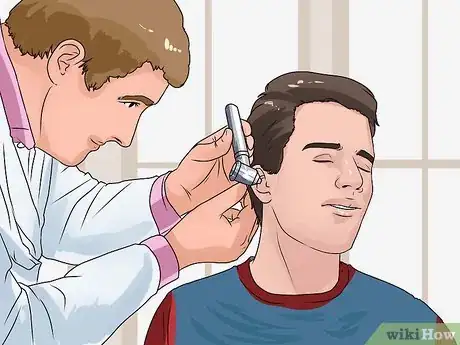

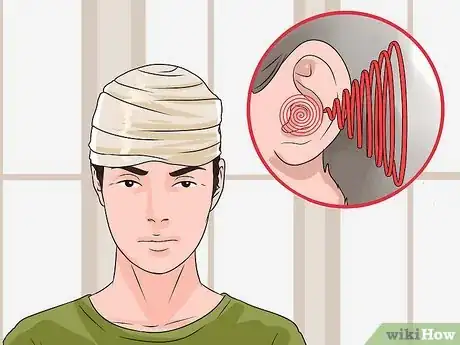
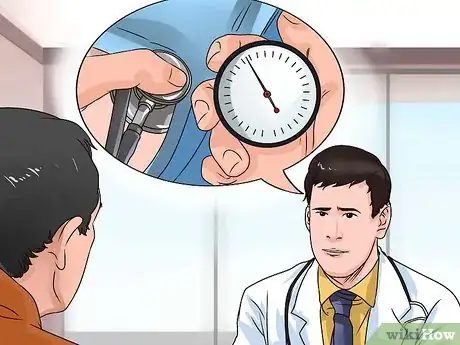
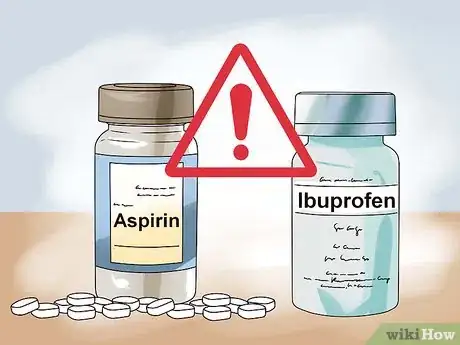
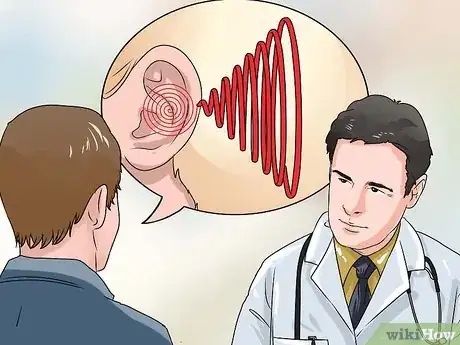

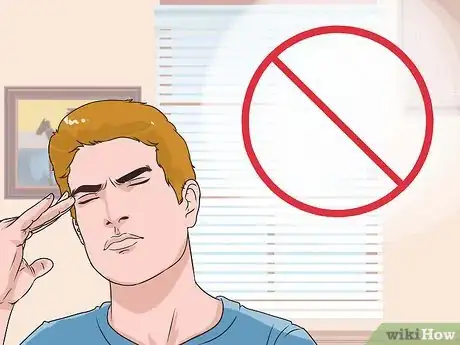
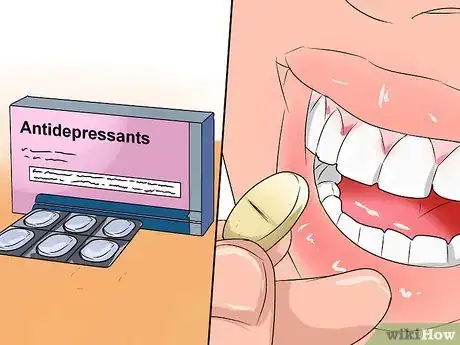
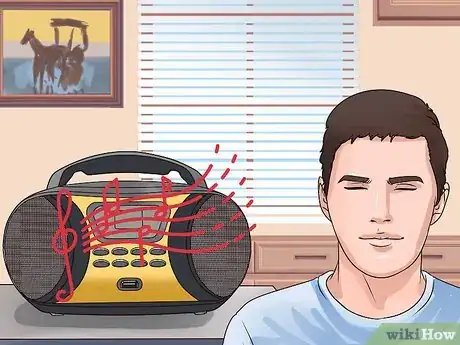
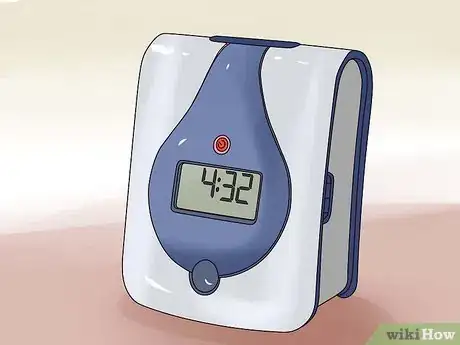
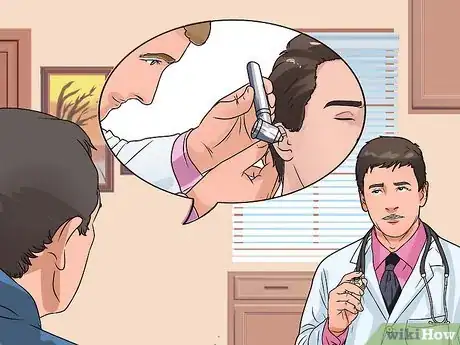

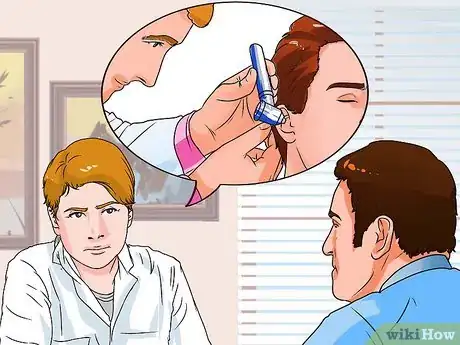


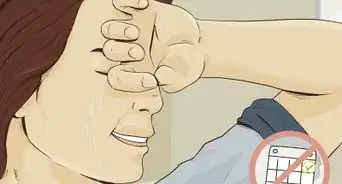


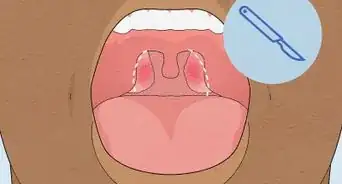





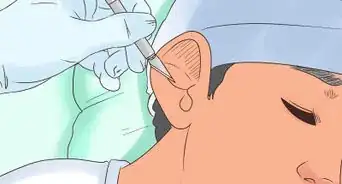
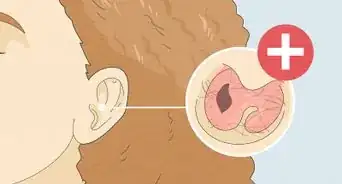











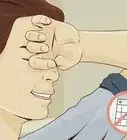

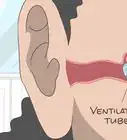



































Medical Disclaimer
The content of this article is not intended to be a substitute for professional medical advice, examination, diagnosis, or treatment. You should always contact your doctor or other qualified healthcare professional before starting, changing, or stopping any kind of health treatment.
Read More...